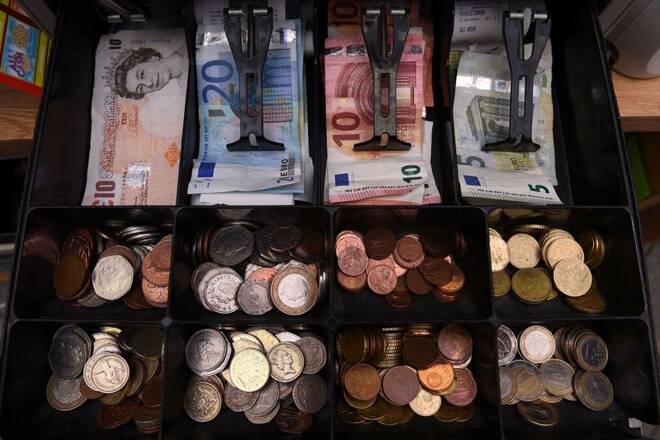Advertisement
Advertisement
Sterling hit as UK inflation hits new 40-year high
By:
LONDON (Reuters) - The British pound extended losses in early trading on Wednesday after official data showed British consumer price inflation hit a new 40-year high last month of 9.1%.
By Danilo Masoni
LONDON (Reuters) – The British pound eased on Wednesday after hot UK consumer inflation data raised new worries over an economic slowdown, just as the Bank of England looks set for more interest rate hikes in the coming months.
Soaring food prices pushed consumer inflation to a new 40-year high of 9.1% in May, the highest rate in the Group of Seven countries and underlining the severity of the cost-of-living crunch in the world’s fifth-largest economy.
The figure matched market expectations and following its release money markets continued to fully price in a 25 basis point (bps) BoE rate hike in August. The odds of a 50 bps hike however fell to around 60% from 74%, even though some analysts said a such a move was still on the cards.
UK inflation
“The latest temperature check of the UK economy shows the mercury rising again, with no end yet in sight to the feverish pace of price rises,” said Susannah Streeter, senior investment and markets analyst at Hargreaves Lansdown.
“The Bank of England has already forecast that inflation will hit 11% by the autumn, and it’s steadily creeping towards that ugly marker sooner rather than later,” she added.
Sterling slumped to a near one-week low against the U.S. dollar but later recovered as the greenback lost strenght. By 1409 GMT it was down 0.1% at $1.2261 following two days of gains and fell 0.3% to 86.10 pence versus the euro.
“The reaction among currency traders was to send sterling lower, as investors fret that rising prices could trigger a slowdown in UK growth during the rest of the year,” said Matthew Ryan, head of market strategy at Ebury.
“Conversely, we think that the data may end up being bullish for sterling should it encourage the Bank of England to raise interest rates more aggressively,” he added.
The BoE raised its benchmark rate by 25 bps to 1.25% last Thursday and said it was ready to act “forcefully” if needed to stamp out dangers posed by inflation, although that lagged stronger action from other central banks including the U.S. Federal Reserve.
ING said it saw scope for a 50 bps BoE rate hike in August.
Traders were also keeping an eye out for two by-elections on Thursday – one in Tiverton and Honiton and another in Wakefield in northern England.
Defeat in either place may further dent Prime Minister Boris Johnson’s vote-winning reputation, and see lawmakers who fear for their futures try to move against him despite giving him a reprieve by calling and losing a confidence vote against him earlier this month.
Concerns over the British economy and the slower pace at which the BoE is expected to tighten policy compared to other central banks have made investors bearish on the pound. The net short position now stands at $4.8 billion, but has fallen from a peak hit in May of $6.3 billion, the largest short since September 2019.
GBP bearish
(Reporting by Saikat Chatterjee, Danilo Masoni, Anisha Sircar and Samuel Indyk, Editing by Andrew Heavens, Kim Coghill and Angus MacSwan)
About the Author
Reuterscontributor
Reuters, the news and media division of Thomson Reuters, is the world’s largest international multimedia news provider reaching more than one billion people every day. Reuters provides trusted business, financial, national, and international news to professionals via Thomson Reuters desktops, the world's media organizations, and directly to consumers at Reuters.com and via Reuters TV. Learn more about Thomson Reuters products:
Did you find this article useful?
Latest news and analysis
Advertisement
